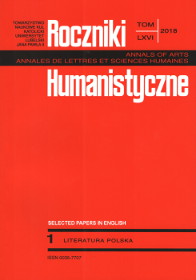Convention as the Source of the Avant-Garde. Remarks on the Inventiveness of Poetics of the Past
Abstract
The Polish version of the article was published in “Roczniki Humanistyczne,” vol. 59 (2011), issue 1.
Modern theoretical-literary treatises, defined as normative poetics, are usually connected with the dominance of the convention and normativism, with obligatory rules, canonical concepts and restrictive directives hampering originality. The present text tries to revise the conviction that convention is a dominant tendency in the development of the old theoretical thought; it tends to show the avant-garde aspects of modern poetics and to present the relations between what is conventional and what is innovative in the most original theoretical texts of late Renaissance and Baroque. Examples of two avant-garde modern poetics—Francesco Patrizi’s theory of wonder formed at the end of the 16th century and the 17th century Emanuele Tesauro’s conceptistic theory—show that tradition and convention are necessary elements of inventive theories. The avant-garde of poetics of the past, contrary to the avant-garde of the 20th century, is not born from the defiance of the earlier theories but is formed by way of modernizing and transforming them. Old inventive theories—despite all the departures from tradition—are still part of the classical paradigm. Hence, the avant-garde character of late-Renaissance and Baroque theoretical reflection consists in a peculiar synergy of convention and novelty.
References
Fokkema, Douwe, “The Concept of Convention in Literary Theory and Empirical Research.” In Convention and Innovation in Literature, edited by Theo D’haen, Rainer Grübel, Helmut Lethen, 1–16. Utrecht: John Benjamins, 1989.
Hathaway, Baxter. Marvels and Commonplaces: Renaissance Literary Theory. New York: Random House, 1968.
Gostyńska, Dorota. Retoryka iluzji. Koncept w poezji barokowej. Warszawa: Instytut Badań Literackich PAN, 1991.
Hathaway, Baxter. Renaissance Literary Criticism. New York: Random House, 1968.
Hauser, Arnold, “Conflicting forces in the history of art: originality and the conventions.” In Arnold Hauser. The Philosophy of Art History, 367–410. New York: Routledge, 2016.
Manley, Lawrence. Convention 1500-1750. Cambridge: Harvard University Press, 1980.
McKeon, Richard. “Literary Criticism and the Concept of Imitation in Antiquity.” In Critics and Criticism. Ancient and Modern, edited with an introduction by Ronald Salmon Crane, 147–175. Chicago: University of Chicago Press, 1952.
Niebelska, Barbara. “Cudowność, paralogizm, koncept.” In Koncept w kulturze staropolskiej, edited by Ludwika Ślęk, Adam Karpiński, Wiesław Pawlak, 33–45. Lublin: Towarzystwo Naukowe KUL, 2005.
Patrizi, Francesco. Della poetica, vol. II, edizione critica a cura di D. Aguzzi Barbagli. Firenze: Instituto Palazzo Strozzi, 1970.
Platt, Peter G. Introduction, to: Wonders, Marvels and Monsters in Early Modern Culture, edited by Peter G. Platt, 15–23. Cranbury: Associated University Press, 1999.
Raimondi, Ezio. Letteratura barocca. Studi sul Seicento italiano. Firenze: L.S. Olschki, 1961.
Salomone, Serena. “Influenze del ‘Sublime’ ps. Longiniano sulla ‘Deca ammirabile’ di Francesco Patrizi da Cherso.” Studi Umanistici Piceni 19 (1966): 101–107.
Sarnowska-Temeriusz, Elżbieta. Przeszłość poetyki. Od Platona do Giambattisty Vica, 366–370. Warszawa: Wydawnictwo Naukowe PWN, 1995.
Sokołowska, Jadwiga. Spory o barok. W poszukiwaniu modelu epoki. Warszawa: Państwowy Instytut Wydawniczy, 1971.
Tesauro, Emanuele. La filosofia morale derivata dall’ alto fonte del grande Aristotele Stagirita. Torino, per Bartolomeo Zapatta, 1672.
Zanardi, Mario. “La Metafora e la sua dinamica di significazione nel ‘Cannocchiale aristotelico’ di Emanuele Tesauro.” Giornale Storico della Letteratura Italiana 157 (1980): 326–329.
Copyright (c) 2018 Roczniki Humanistyczne

This work is licensed under a Creative Commons Attribution-NonCommercial-NoDerivatives 4.0 International License.





